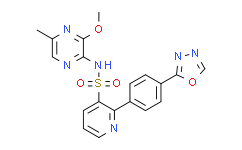Zibotentan potently inhibits the binding of iodine-ET-1 to cloned human ETA expressed in mouse erythroleukaemic cells, with a pIC50 (concentration to inhibit 50% of binding) value of 22 nM.
Zibotentan (48 hours) treatment increases the number of early apoptotic cells in serum-starved A2780 WT cells.
Zibotentan (ZD4054; 1 μM; 24 hours) treatment shows significant inhibition of cell proliferation in serum-starved HEY, OVCA 433, SKOV-3, and A-2780 cells.
Zibotentan (ZD4054; 1 μM; 48 hours) treatment induces an increase in apoptotic cells. Zibotentan inhibits bcl-2 and activates caspase-3 and poly(ADP-ribose) polymerase proteins..
Zibotentan (ZD4054; 1 μM) decreases the endogenous ET-1-induced phosphorylation/activation of both kinases (AKT and p42/44MAPK) in HEY cells.
Zibotentan treatment also results in a reduction of ETAR-driven angiogenesis and invasive mediators, such as vascular endothelial growth factor, cyclooxygenase-1/2, and matrix metalloproteinase (MMP).
Medlife has not independently confirmed the accuracy of these methods. They are for reference only.
Cell Proliferation Assay
| Cell Line: |
HEY, OVCA 433, SKOV-3, and A-2780 cells
|
| Concentration: |
1 μM |
| Incubation Time: |
24 hours |
| Result: |
Showed significant inhibition of cell proliferation. |
Apoptosis Analysis
| Cell Line: |
HEY and OVCA 433 cells |
| Concentration: |
1 μM |
| Incubation Time: |
48 hours |
| Result: |
Induced an increase in apoptotic cells. |



 扫码关注公众号
扫码关注公众号